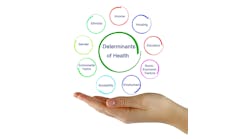Researchers at Cleveland Clinic and MetroHealth are using “digital twin” technology to better understand healthcare disparities based on where someone lives.
Digital twins are sophisticated data models built from electronic health records to analyze health trends. The technology aids in accurately representing complex economic, environmental and social factors that can lead to disparities between neighboring communities.
The project will use data from a combined research registry of more than 250,000 patients from the two health systems. The research team, led by Jarrod Dalton, Ph.D., of Cleveland Clinic, and Adam Perzynski, Ph.D., of MetroHealth.
“Where a person lives or works can shape their health outcomes – including life expectancy and risk of developing diseases like cancer or diabetes. Americans from socioeconomically disadvantaged communities are more likely to have heart attacks and stroke, and are expected to live 10 fewer years than wealthier Americans,” said Dalton, director of Cleveland Clinic’s Center for Populations Health Research, in a statement. “Our goal is to design an approach to help health systems, governments and organizations collaborate and strategize ways to address clear disparities.”
The work is supported by a new $3.14 million grant from the National Institutes of Health to Cleveland Clinic, The grant builds upon previous research published by Dalton and Perzynski in the Annals of Internal Medicine that the neighborhood where people reside may be linked with risk of cardiovascular events. They analyzed patient data and found people from socioeconomically disadvantaged neighborhoods had major cardiovascular events at more than twice the rates predicted by traditional risk assessment tools.
In the new grant, the team will initially build the infrastructure for “Digital Twin Neighborhoods,” synthesizing de-identified health information from electronic health records that will include some information on social determinants of health.
These virtual neighborhoods, digital replicas of real communities, including biological, social and geographic information, expand access to data and algorithms for understanding place-based health and social inequalities.
The researchers will evaluate the effectiveness of this approach through initial projects using the tool: assessing regional mental health initiatives on a neighborhood level; evaluating the potential impacts of introducing new services on heart disease burden in communities; and evaluating how frequent and/or economically-driven relocations of residence affect health outcomes.
“This project aims to chart a new course for understanding place-based population health strategies and improving health outcomes,” explained Perzynski of MetroHealth’s Population Health Research Institute, in a statement. “Evaluating technology like digital twins in the research space can make it easier for organizations to take a data-backed approach to public health interventions. Instead of building these models from scratch, other health systems and organizations can adapt the framework for their own needs.”


